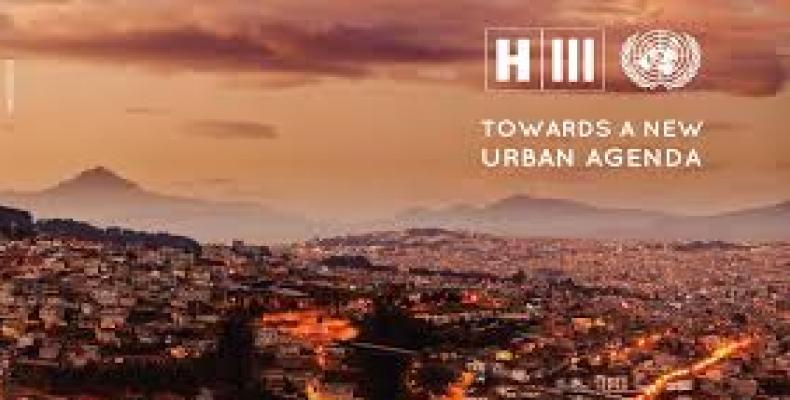Quito, October 18 (RHC)-- Global leaders, policy makers, architects, urban planners, and others are meeting in Ecuador's capital city of Quito for the first major summit in two decades aimed at tackling issues facing the world's urban dwellers and fast-expanding cities.
The United Nations Conference on Housing and Sustainable Urban Development, known as Habitat III, has the stated objective of setting a "New Urban Agenda" for sustainable development.
The four-day international conference is the third of its kind in U.N. history, and experts argue it is increasingly important as this century is set to see the majority of the world's people increasingly living in cities the population scale was definitely tipped from rural to urban in recent years.
Lawmakers are set to adopt this week the draft core document steering the event, the 23-page "New Urban Agenda" that sets a roadmap for urban development and addressing burning issues facing sprawling cities such as inequality, affordable housing, land rights, resource access, food security, climate change and living conditions, particularly in slums.
The draft text also outlines its stated vision to the "right to the city" -- a concept coined by by Marxist philosopher and sociologist Henri Lefebvre and championed by geographer and political economic David Harvey -- invoking a call of cities that work and for people and the environment, not for profit.
Issues on the table include climate change, renewable energy, social inequality, transformation, gender equality, financing, urban security and more.
But while many believe Habitat III will be pivotal in forging new urbanization strategies, critics argue that given the gravity of the issues at hand, the summit and its New Urban Agenda fall far short. What's needed, they say, is a more concrete plan of action to make a difference in poor city-dwellers' lives while capping the impact on the environment from cities, which, while covering less than 2 percent of the planet's surface, are responsible for emitting 70 percent of global greenhouse gases.
"It doesn't have much bite. It talks a lot about commitments but has no dates, places or numbers," former urban affairs specialist for the World Bank, Michael Cohen, told the Thomson Reuters Foundation of Habitat III's New Urban Agenda. "It's easy for governments to sign something that is not enforceable."
The problem, critics say, is a lack of measurable objectives to keep states accountable to their commitments in a meaningful way. Habitat III links into number 11 of the U.N. Sustainable Development Goals -- the new generation of the Millennium Development Goals -- which aims to "make cities and human settlements inclusive, safe, resilient and sustainable."
The New Urban Agenda is a non-binding document that will only provide guidelines for countries and organizations that sign on to its commitments, meaning it will ultimately depend on the initiative and willingness of governments to create effective public policies to make cities less unequal and more sustainable.
Global Leaders Take on Big Urban Issues at Habitat III in Quito

Related Articles
Commentaries
MAKE A COMMENT
All fields requiredMore Views
- Ecuador's Electoral Debate: Luisa González urges Noboa not to lie to the people and keep his campaign promises
- Cuba to play women's soccer friendlies against Peru
- President Nicolás Maduro denounces U.S. sanctions and tariffs against Venezuela
- Artistic swimmers prepare for continental competition
- President Nicolas Maduro rejects Marco Rubio's threats against Venezuela

